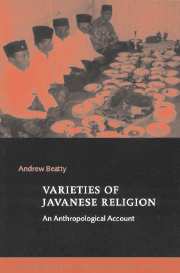Book contents
- Frontmatter
- Contents
- Acknowledgements
- List of plates
- Glossary
- Map of East Java
- 1 Introduction
- 2 The slametan: agreeing to differ
- 3 The sanctuary
- 4 A Javanese cult
- 5 Practical Islam
- 6 Javanism
- 7 Sangkan Paran: a Javanist sect
- 8 Javanese Hindus
- 9 Conclusion
- Notes
- List of references
- Index
- Cambridge Studies in Social and Cultural Anthropology
- Frontmatter
- Contents
- Acknowledgements
- List of plates
- Glossary
- Map of East Java
- 1 Introduction
- 2 The slametan: agreeing to differ
- 3 The sanctuary
- 4 A Javanese cult
- 5 Practical Islam
- 6 Javanism
- 7 Sangkan Paran: a Javanist sect
- 8 Javanese Hindus
- 9 Conclusion
- Notes
- List of references
- Index
- Cambridge Studies in Social and Cultural Anthropology
Summary
A temple festival
In May 1992 I attended the festival of Saraswati – goddess of learning – at Sugihwaras temple in Glenmore, a plantation district in the west of the regency. There are said to be ninety-nine Hindu temples in Banyuwangi, some half-dozen of which are especially important as they are built on sites associated with the pre-Islamic kingdoms. At these sacred points, on Javanese soil, the faithful gather to celebrate the major festivals of the Hindu calendar.
The temple in the hamlet of Sugihwaras was built in 1968 at one such site. Ancient objects had been found there – a dagger, statues, shards. These were said to be relics of Majapahit, the great Hindu-Buddhist state of Java's golden age. The accuracy of the identification was not important – the objects could have derived from the court of Blambangan – but a tangible link with the past had been found and a temple was begun. This was not the first religious building in the hamlet: two beautiful old stucco mosques and a langgar, now little used, testified to a once thriving religious community. But now the settlement was sparsely populated, lost in the vast plantations of Glenmore and reachable only by a dirt road. An unobtrusive place, then, in which to stage a Hindu revival.
I was to hear the word Majapahit many times during the festival, and with a similar monotonous frequency at other events in the Javanese Hindu year.
- Type
- Chapter
- Information
- Varieties of Javanese ReligionAn Anthropological Account, pp. 211 - 238Publisher: Cambridge University PressPrint publication year: 1999



